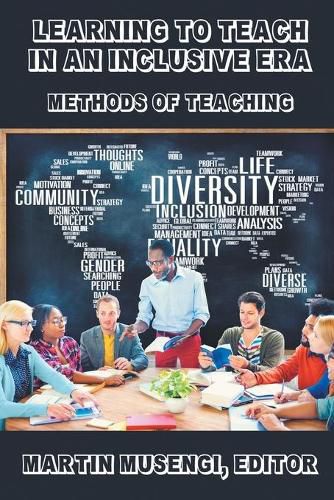Readings Newsletter
Become a Readings Member to make your shopping experience even easier.
Sign in or sign up for free!
You’re not far away from qualifying for FREE standard shipping within Australia
You’ve qualified for FREE standard shipping within Australia
The cart is loading…






This title is printed to order. This book may have been self-published. If so, we cannot guarantee the quality of the content. In the main most books will have gone through the editing process however some may not. We therefore suggest that you be aware of this before ordering this book. If in doubt check either the author or publisher’s details as we are unable to accept any returns unless they are faulty. Please contact us if you have any questions.
Learning to Teach in an Inclusive Era starts a welcome conversation on educational inclusion. Such a conversation is missing in many developing countries; therefore, this is an important contribution to an emerging field that is still shrouded in uncertainty.
Written by diverse lecturers in teacher education, this book is based on several authors’ interactions among themselves, with student-teachers in lecture rooms, in dissertation supervision, and on teaching practice supervision in several African countries. Such interactions revealed the tensions in understanding what inclusion is, and it is these tensions that the book tries to debunk by focusing on teaching methods that can make inclusion possible.
The first two chapters are introductory and provide the conceptual framework, binding the book together by mapping out context and content.
The next seven chapters form the bulk of the book and focus on specific aspects of inclusive education, including individualization, task analysis, peer tutoring, play, multi-sensory approaches, precision, and milieu teaching. Although these chapters use diverse illustrations, the final two chapters focus on two sensory disabilities: hearing and visual impairment.
This book addresses inclusive education as one of the most pressing issues facing educators globally. The book provides a platform for critical engagement initiated by emerging African scholars.
$9.00 standard shipping within Australia
FREE standard shipping within Australia for orders over $100.00
Express & International shipping calculated at checkout
This title is printed to order. This book may have been self-published. If so, we cannot guarantee the quality of the content. In the main most books will have gone through the editing process however some may not. We therefore suggest that you be aware of this before ordering this book. If in doubt check either the author or publisher’s details as we are unable to accept any returns unless they are faulty. Please contact us if you have any questions.
Learning to Teach in an Inclusive Era starts a welcome conversation on educational inclusion. Such a conversation is missing in many developing countries; therefore, this is an important contribution to an emerging field that is still shrouded in uncertainty.
Written by diverse lecturers in teacher education, this book is based on several authors’ interactions among themselves, with student-teachers in lecture rooms, in dissertation supervision, and on teaching practice supervision in several African countries. Such interactions revealed the tensions in understanding what inclusion is, and it is these tensions that the book tries to debunk by focusing on teaching methods that can make inclusion possible.
The first two chapters are introductory and provide the conceptual framework, binding the book together by mapping out context and content.
The next seven chapters form the bulk of the book and focus on specific aspects of inclusive education, including individualization, task analysis, peer tutoring, play, multi-sensory approaches, precision, and milieu teaching. Although these chapters use diverse illustrations, the final two chapters focus on two sensory disabilities: hearing and visual impairment.
This book addresses inclusive education as one of the most pressing issues facing educators globally. The book provides a platform for critical engagement initiated by emerging African scholars.